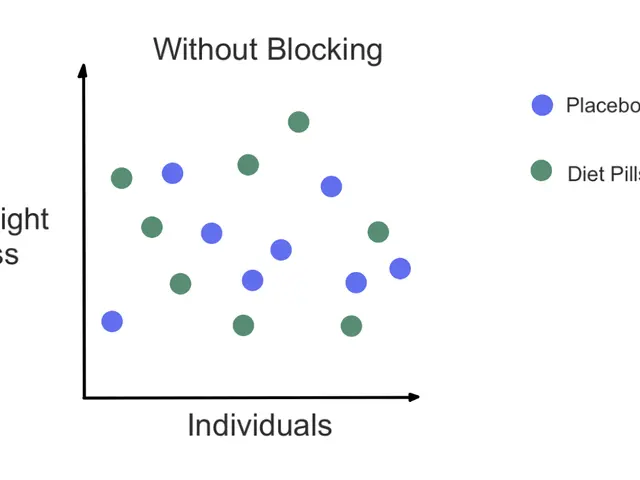Gout Nutrition: Recommended and Discouraged Foods for Management
Gout, a type of inflammatory arthritis, is characterised by high levels of uric acid in the blood, leading to painful attacks in the joints. To help manage gout symptoms and reduce the risk of flares, following a low-purine diet is essential.
People with gout may wish to limit their intake of carbohydrates that spike blood sugar, including sugary breakfast cereals, certain fruits, starchy vegetables, rice, snacks, and most white bread. However, a healthy meal plan for gout should not just focus on reducing carbohydrate intake, but also on choosing low glycemic index (GI) foods, which may lower uric acid levels more effectively.
A low-purine diet emphasises low-purine protein sources such as eggs, nuts, peanut butter, low-fat or fat-free dairy products, certain freshwater fish like carp, tilapia, and white meat chicken breast. These provide necessary protein with minimal purine content.
Fruits and vegetables are also beneficial, with all fruits and fruit juices being low in purines. Vegetables not listed as medium or high purine, such as mustard greens, broccoli, kale, radishes, squash, are recommended. Fruits rich in vitamin C like strawberries, pineapples, and especially cherries are particularly beneficial as they help reduce inflammation and uric acid levels, lowering the risk of gout flares.
Carbohydrates, when chosen wisely, can aid in uric acid excretion via urine. Bread, pasta, rice, noodles, potatoes, and cereals contain safe levels of purines.
Fats and oils, such as vegetable oils like olive oil, peanut oil, and sesame oil, are good dietary fats that do not increase purine intake.
Beverages like water (2 to 2.5 liters daily depending on individual factors), soda, tea, coffee, and cocoa are suitable. Drinking plenty of water helps flush uric acid. Supplementing with vitamin C (500-1000 mg/day) may further reduce uric acid levels.
Additional considerations include avoiding soups made with meat extract or broth, which are high in purines. Prefer cooking methods like steaming or boiling over frying to reduce fat intake that might worsen gout.
Consuming alcohol, especially beer and spirits, can worsen gout symptoms and increase the risk of gout flares. Following a meal plan based on the Mediterranean diet could reduce uric acid levels and support overall health for people with gout.
Obesity is a risk factor for developing gout, and losing a few pounds can help reduce uric acid levels, reduce pressure on painful joints, lower the risk of heart disease, build strength and flexibility.
A healthy menu for a person with gout could include loaded oatmeal for breakfast, a loaded salad with leafy greens, vegetables, boiled eggs, fruit, avocado, flaxseed, and olive oil and vinegar dressing for lunch, half a cup of skinless chicken breast, half a cup of brown rice, barley, or another type of whole-grain, broccoli, kefir, and plenty of water for dinner.
A combination of medications and diet changes can help manage gout. Gout flares can begin suddenly, often at night, and may last for 1-2 weeks. Fasting may trigger gout symptoms if a person becomes dehydrated, so people with gout should take special precautions when fasting and drink enough fluids.
People with gout should limit foods high in fructose to prevent overproduction of uric acid. Low-purine foods such as low-fat dairy products, pulses, vegetables, fruits, whole grains, nuts, soy products, lean proteins, and water can help form a healthy, balanced diet for people with gout.
In severe cases, gout leads to inflammation, pain, and joint damage. By following a low-purine diet and making lifestyle changes, people with gout can effectively manage their symptoms and reduce the risk of future flares. Anyone who smokes should ask a doctor for help with a plan to quit.
- Aq (unclear context, unable to create a sentence)
- Food low in purines, such as eggs, nuts, low-fat dairy products, and white meat chicken breast, can help manage gout symptoms.
- Obesity is a risk factor for developing gout, making weight management crucial.
- Type of disease called diabetes, depression, and atopic dermatitis can also be linked to diet and lifestyle choices, as per health-and-wellness science.
- Foods high in fructose should be limited to prevent overproduction of uric acid, which can worsen gout symptoms.
- Incorporating foods with low glycemic index can be beneficial for managing gout symptoms and reducing the risk of flares.
- To effectively manage gout, one could consider a diet similar to the Mediterranean diet, which is known to support overall health.
- Crohn's disease, another predictive health condition, may be impacted by nutrition, fitness-and-exercise, and foodandfoodbenefits choices as well.
- COPD, like gout, can be managed through a combination of medications and lifestyle changes, including diet and fitness routines. Drinking plenty of water and staying hydrated is essential for those with gout, especially during fasting.





